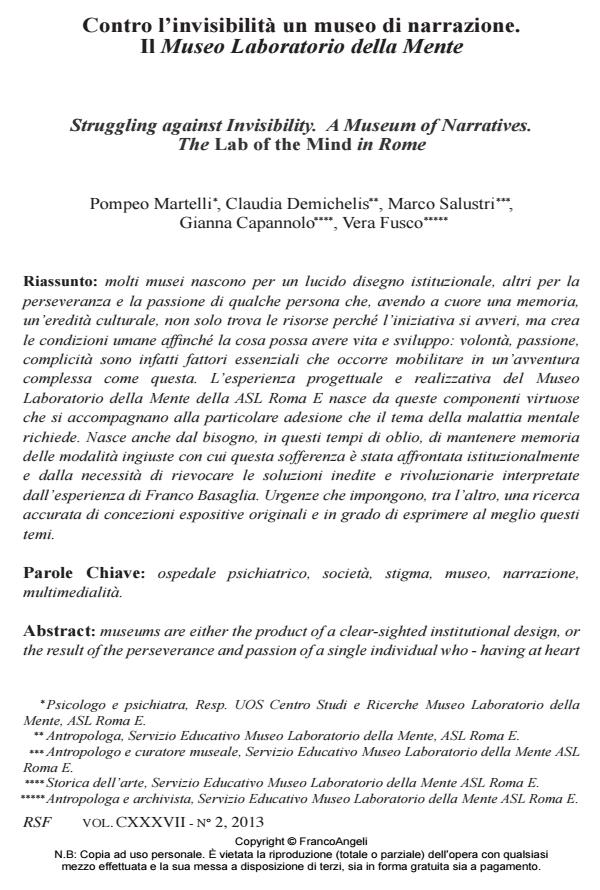Struggling against Invisibility. A Museum of Narratives. The Lab of the Mind in Rome
Journal title RIVISTA SPERIMENTALE DI FRENIATRIA
Author/s Laboratorio della Mente Il Museo
Publishing Year 2013 Issue 2013/2
Language Italian Pages 12 P. 51-62 File size 1738 KB
DOI 10.3280/RSF2013-002005
DOI is like a bar code for intellectual property: to have more infomation
click here
Below, you can see the article first page
If you want to buy this article in PDF format, you can do it, following the instructions to buy download credits

FrancoAngeli is member of Publishers International Linking Association, Inc (PILA), a not-for-profit association which run the CrossRef service enabling links to and from online scholarly content.
Museums are either the product of a clear-sighted institutional design, or the result of the perseverance and passion of a single individual who - having at heart a personal remembrance or a cultural heritage - finds the resources and builds the human context to carry out such a venture. Determination, passion and complicity are critical components of these intricate endeavors. The Museo Laboratorio della Mente (Museum Lab of the Mind founded by the Local Health Unit ‘ASL Roma E’) was created thanks to these valuable human components, truly basic in the field of mental illness. In our times of oblivion, this museum responds to the critical need to keep alive the memory of the past discriminatory practices of mental asylums and also to commemorate Franco Basaglia’s unconventional, often radical approach in mental health. These two critical aims require careful research work to develop original ways in displaying effectively these issues.
Keywords: Psychiatric hospital, society, stigma, museum, narrative, multimedia.
- Basaglia F. Conferenze brasiliane (1979). Milano: Raffaello Cortina Editore; 2000 (ed. or. 1984).
- Losavio T. Roma Capitale senza manicomio: la chiusura del S. Maria della Pietà. In: L’Ospedale Psichiatrico di Roma. Dal Manicomio Provinciale alla chiusura. Bari: Edizioni Dedalo; 2003, Vol. III.
- UOS Centro Studi e Ricerche ASL Roma E, Studio Azzurro. Museo Laboratorio della Mente. Milano: Silvana Editoriale; 2010.
- Studio Azzurro. Musei di narrazione: percorsi interattivi e affreschi multimediali. Milano: Silvana Editoriale; 2011.
- Clemente P, Rossi E. Il terzo principio della museografia. Roma: Carocci; 1999.
- Hooper-Greenhill E. I musei e la formazione del sapere. Le radici storiche, le pratiche del presente. Milano: Il Saggiatore; 2005 (ed. or.: Museums and Shaping of Knownedge. London-New York: Routledge; 1992).
- Karp I, Lavine SD, Mullen Kreamer C. Musei e identità. Politica culturale della collettività. Bologna: Clueb; 1995 (ed. or.: Museums and communities. The politics of public culture. Washington and London: Smithsonian Institution; 1992).
- Clemente P. Museografia e comunicazione di massa. Roma: Aracne; 2004.
- Ribaldi C, ed. Il nuovo museo. Origini e percorsi. Milano: Il Saggiatore; 2005.
- Calvino I. Se una notte d’inverno un viaggiatore. Torino: Einaudi; 1979.
- Calvino I. Lezioni americane. Sei proposte per il prossimo millennio. Milano: Garzanti; 1988.
- Bambergers W. Adelbert Ames Jr. A Life of Vision And Becomingness. Bamberger Books; 2006.
- Helmholtz H. Handbuch der physiologischen Optik. Hamburg and Leipzig: L. Voss; 1856-67.
- Ramachandran VS. L’uomo che credeva di essere morto. Milano: Mondadori; 2012, cap. II.
- Tosatti B. La storia dell’arte in manicomio. In: UOS Centro Studi e Ricerche ASL Roma E, Studio Azzurro. Museo Laboratorio della Mente. Milano: Silvana Editoriale; 2010, p. 61-70.
- Gonin D. Il corpo incarcerato. Torino: Gruppo Abele; 1994 (ed.or. : La santé incarcérée. Médicine et conditions de vie en détention. L’Archipel; 1991).
- Foucault M. La vita degli uomini infami. Bologna: Il Mulino; 2009.
- Basaglia F. L’utopia della realtà. Torino: Einaudi; 2005.
- UOS Centro Studi e Ricerche ASL Roma E, Studio Azzurro. Portatori di storie. Da vicino nessuno è normale. Milano: Silvana Editoriale; 2012.
- Cameron D. Il museo: tempio o forum. In: Ribaldi C, ed. Il nuovo museo. Origini e percorsi. Milano: Il Saggiatore; 2005, p. 45-63 (ed. or.: The museum: a temple or the forum. In: Curator. XIV, 1, Altamira Press, 1971, p.11-24).
- Innocenti P. European Crossroads. Museum, cultural dialogue and interdisciplinary networks in a transnational perspective. Politecnico di Milano: Mela Books; 2012.
Laboratorio della Mente Il Museo, Contro l’invisibilità un museo di narrazione. Il Museo Laboratorio della Mente in "RIVISTA SPERIMENTALE DI FRENIATRIA" 2/2013, pp 51-62, DOI: 10.3280/RSF2013-002005